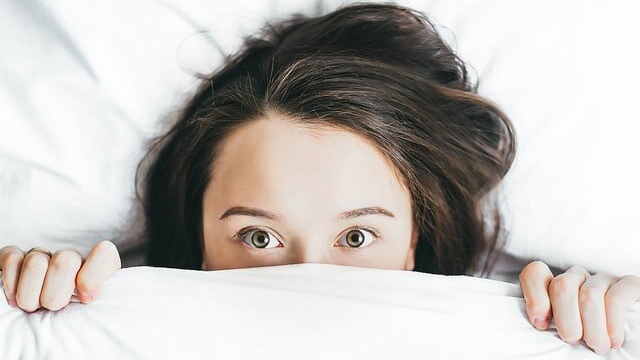How to fix your sleep cycle – 7 tips to get a better night in bed
Mindfulness coach Louise Murray gives us here seven tips for fixing your sleep cycle and getting a better night in bed

Welcome to Fit & Well's guide to fixing your sleep cycle. Here, mindfulness coach Louise Murray gives us her seven top tips for getting a better night's sleep.
“If you’re suffering from broken sleep, or can’t fall asleep in the first place, stress and anxiety surrounding the pandemic is most likely to blame,” explains Louise. “The usual concerns that might keep us awake – money, relationships, health – are all heightened under lockdown as we have more than usual to worry about.
- Uncomfortable bed disrupting your sleep? Try one of the best mattress toppers
- Best sleeping positions: avoid pain and sleep better
- How to fall asleep fast: 10 tried-and-tested hacks
“Even if we don’t feel like we’re stressed, our bodies tell a different story when we go to bed and our brains start to subconsciously process our thoughts.
“All of these factors conspire to interrupt our sleep cycle and our ability to achieve both the quantity and quality of sleep we need is compromised and we are left feeling totally exhausted.
“Fortunately, there are steps we can take to improve our quality of sleep and give ourselves the deserved rest we need to function. You’re all probably aware of the need to switch off from your electronic devises, be in a cool room and avoid stimulants like caffeine during the afternoon - so here are some sleep aids you might not have known about…
How to fix your sleep cycle: routine
“This is the most important factor in getting good sleep,” says Louise. “Routine is the guardian of good sleep. It protects our sleep. So, try and preserve your old sleeping pattern if you want a good night's kip.
Get up at your normal time and go to bed at the normal time, however tempting it might be to do otherwise. And those extra naps some of us are now taking? I've got bad news. You've got to save your sleepiness for bedtime.
Get the Fit&Well Newsletter
Start your week with achievable workout ideas, health tips and wellbeing advice in your inbox.
Treat being sleepy as a precious resource and don't waste it on a short daytime nap. If you really do need a nap, take a micro-nap - make sure they’re short and not too late, as in, no longer than 20 or 30 minutes and early in the day. A short snooze before 4pm can be refreshing and revitalizing, whereas longer and later ones have the opposite effect.
How to fix your sleep cycle: daylight
“Our eyes need exposure to outdoor light because of a hormone in our body called melatonin - it regulates our sleep and wake pattern. If we stay indoors, it means a lack of exposure to proper light, which reduces melatonin levels.
So do your exercise outdoors if you can and make sure you take advantage of the once-a-day trip outdoors you're allowed during lockdown. To improve the results even more, go outside at the same time each day, so it becomes part of your daily routine.
How to fix your sleep cycle: park your stress
“It's normal to have worries and stress at a time like this, there's so much uncertainty - we've never been in this situation before... will it go back to normal? Or is this the new normal? It's that unknown which causes more stress and anxiety.
While it's OK to be worried, try not to take those worries to bed. Tell yourself you've done all you can for that day and there's nothing more to do. Then pick it up again the next day, after a good night's sleep.
Noting things down can help. You can help to reduce a busy brain at night by keeping a journal and pen near your bed. If anxious thoughts are preventing you from getting some shut-eye and you can't stop going over your to-do list in bed, you should write it all down.
Sometimes it can be trying to remember them that actually keeps us from switching off properly. Also jot down the things you need to do the next day, this will help you ‘release’ them from your memory.
How to fix your sleep cycle: use breathing techniques to de-stress
“Sleep is needed to maintain your emotional balance, and you can lose this balance when the emotional part of your brain becomes hyperactive – with stress levels increasing. Take a few moments in the day to stop and concentrate on breathing slowly, deeply and purposefully – this will help you not get distracted by thoughts and feelings and will also activate the parasympathetic nervous system ‘your rest and digest’ system which helps ease your body into a state of relaxation.
I love the 4-7-8 breath technique. Breathe in for 4, hold for 7, breathe out for 8. Repeat it 3-4 times and feel a wave of calmness through your body.
How to fix your sleep cycle: don't work from your bed
“For a restful night's sleep, you want your brain to associate your bed with sleep and intimacy, and nothing else. If you start to merge the boundaries between work and rest, one will intrude into the other.
When it comes to switching off the light at night, if you've been in your bed all day working on your laptop, thoughts about work are more likely to persist. So as tempting as it might be, if you are working from home, don’t work from your bed.
How to fix your sleep cycle: avoid sleep-stealing snacks
“If you’re having trouble falling asleep, cut yourself off refined sugar and processed carb snacks by early afternoon. Refined grains and sugars disrupt your steady-state down-time metabolism, creating blood sugar and insulin fluctuations that may well wake you up at odd times.
If you need to snack, make it a high-protein snack because that should avoid the blood sugar/insulin rollercoaster and it may provide a helpful dose of L-tryptophan, an amino acid needed to produce melatonin.
How to fix your sleep cycle: don't ignore your sleep wave
“So you stayed up a little too late watching Netflix. Now, you’re in bed and wide awake. If you’ve been there for 30-45 minutes waiting for sleep to come, odds are, it won’t, not for at least another hour and maybe longer.
You’ve missed catching the sleep wave or what some researchers call the “sleep gate,” the period of time that your body will let you fall asleep. Researchers have found that the body cycles through different sleep phases in the course of a night. At the beginning of each phase, which lasts from 90 minutes to 2 hours, the “gate” opens and if you miss it, you’re out of luck.
So if it’s been 45 minutes and nothing’s happening, sleep-wise, there’s no point in fighting it. That will just stress you out more as the anxiety that surrounds insomnia makes the insomnia that much worse, a classic vicious circle.
So break it! Get out of bed and do something calming for the next hour or hour and a half – read a book (in low light!), or do some other relaxation technique (i.e. meditation, restorative yoga, breathing exercises). Time will pass, pleasantly, and you’ll be ready to ride the next sleep wave when it hits.
Launched in 2020, Fit&Well.com is all about helping you meet your health and fitness goals in ways that are fun and achievable. With news and features on fitness, weight loss, running, nutrition, yoga, wellness and more, we're committed to helping you wherever you are on your fitness journey. We break down the best fitness tech, with reviews, buying guides and the latest deals on fitness and wellness kit, from dumbbells to diffusers.
We cater for all difficulty levels here. It doesn't matter if you're a beginner in the world of fitness or you're gearing up for your tenth marathon: we're all moving towards the same goal – creating a healthier, happier you. From guides on getting started doing walks around the block, to creating the perfect work-from-home space, to eating to fuel your first triathlon. It's all here.
